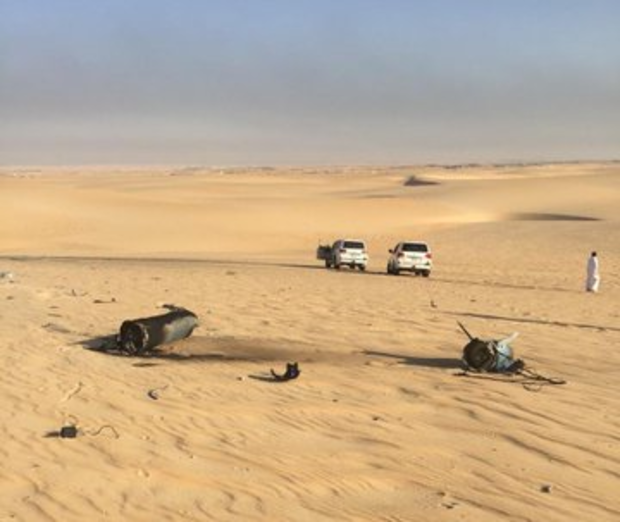Last Updated Sep 18, 2019 8:45 AM EDT
Saudi Arabia was expected to directly blame Iran on Wednesday for the raid that heavily damaged two oil facilities in the kingdom over the weekend. Secretary of State Mike Pompeo was on his way to Saudi Arabia to discuss the attack "and coordinate efforts to counter Iranian aggression in the region," according to the State Department.
Iran has denied any involvement, but on Wednesday President Hassan Rouhani said Saudi Arabia should see the attack as a warning to end its war in Yemen.
CBS News senior national security correspondent David Martin said the most urgent order of business for Pompeo will be to discuss the installation of better air defenses around the Saudis' oil facilities, which have suddenly proven vulnerable to attack.
U.S. intelligence agencies were caught flatfooted, never expecting Iran would be so bold as to attack Saudi Arabia directly. A U.S. official told CBS News the U.S. has identified the exact locations in southern Iran from which the drones and cruise missiles were launched at Saudi Arabia's oil facilities.
Now the Trump administration is weighing targets for potential retaliatory action.
Pompeo will discuss with Saudi leaders better ways to protect their most valuable asset: oil.
The U.S. says Iran exploited a gaping hole in Saudi air defenses and fired a volley of two dozen drones and nine cruise missiles. They flew low and at a relatively slow speed, hitting Saudi's Aramco oil sites from the north — not the south, as would have been the case if the attack came from Yemen's Houthi rebels, as Iran claims.
Saudi Arabia's Crown Prince Mohammed bin Salman said Wednesday that his country was already beefing-up its security measures in the air and the water. CBS News correspondent Ian Lee said the Saudis had also committed to joining a U.S.-backed force to protect vital shipping lanes and oil facilities in and around the Persian Gulf.
U.S. officials say experts have examined pieces of the wreckage on the ground, identified the specific type of cruise missiles and drones fired on Saturday and determined they were made in Iran. A senior administration official told CBS News there was "100%" certainty on that point.
Secretary Pompeo will ask the Saudis what they want to do in response to what U.S. officials have called "a complex and coordinated attack" on their infrastructure.
One option is a military strike against the facilities from which those drones and cruise missiles were launched.
"We're locked and loaded, and we're ready to defend our interests and our allies in the region, make no mistake about it," Vice President Mike Pence said Tuesday.
Joint Chiefs Chairman General Joseph Dunford told reporters the president has not yet asked for any military options.
Iran backs Shiite Muslim militant factions across the Middle East, from Hezbollah in Lebanon and the Houthis in Yemen, to the militias in Iraq that helped defeat ISIS. Iran has long used these forces as proxy extensions of its own power in the region. On Wednesday the Islamic Republic warned that any Iranian response to an attack on its territory would be rapid, and not "limited to its source."
"In an official note to the United States via Swiss embassy, Iran has reiterated that it was not behind attacks on Saudi Arabia's oil facilities and it has warned that any move by America against Iran will get immediate reaction," Iran's state-run ISNA news agency reported. The note, confirmed to CBS News by Iranian diplomats, included the threat that Iran would not limit its reaction to a hypothetical military strike to the nation that carries out an attack.
It was unclear on Wednesday whether Mr. Trump was favoring a military response, which would risk a dramatic escalation in the region.
"By sending your secretary of state, it almost implies that you're leaning more toward diplomatic solutions to this issue," Joseph Westphal, a former U.S. Ambassador to Saudi Arabia, told CBS News. He said Pompeo's visit "will be important to ensure that both U.S. and the Saudis have a unified response to this attack."
Mr. Trump had talked about trying to strike a new deal with Iran since pulling the U.S. out of the 2015 nuclear agreement hashed out by his predecessor, but now he says he no longer wants to meet Iran's president when world leaders gather for the United Nations General Assembly next week.
© 2019 CBS Interactive Inc. All Rights Reserved.
https://www.cbsnews.com/news/iran-news-donald-trump-mulls-response-saudi-arabia-to-blame-iran-attack-oil-facilities-today-2019-09-18/
2019-09-18 11:06:00Z
52780382632806

Tidak ada komentar:
Posting Komentar